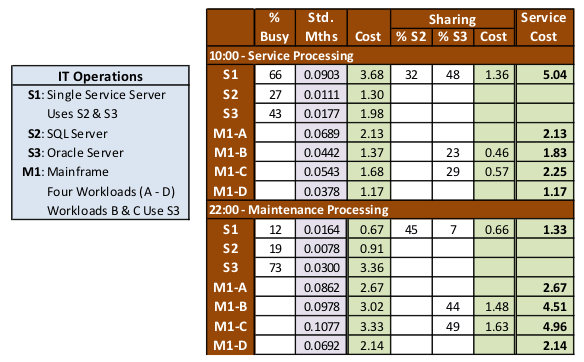Based on Capacity Planning
Usage based allocation and
effective cost allocation is
based on a Capacity
Planning framework. The
process requires the
collecting of performance
information, system and
application workload
forecasting, and the use of
metrics for cost
optimization and service
delivery.
Fair and Equitable
A usage based allocation
system is the only one (of
several) that is fair and
equitable. It identifies who
is using what and is able to
allocate the associated
costs in a manner allowing
for better business control
of shared IT resources.
Automated Process
A usage based allocation
process can be very
complex and needs to be
automated for effective
use. The process must be
able to automatically
collect performance
information, determine
usage and by who, assign
unit costs to the
processing, and then
produce the information
needed for effective
reporting and control.
Heterogeneous Systems
There is virtually no IT shop today that depends on a single type of server to perform all of its
service delivery. The modern service delivery environment contains systems that are of different
chipsets, processor speeds, architectures, and other attributes that do not allow for simple
measurement or comparison. There are also situations were applications are running on or using
multiple systems that are not of the same type. These types of situation results in the inability to
effectively measure, compare, and forecast IT services.
RG Solutions® was designed to handle heterogeneous system environments. The product’s
processing uses a metering framework that allows for the measurement of different systems and
architectures. It not only measures the individual systems, but also allows for the “merging” of
information in a manner that is consistent and accurate. Resulting measures can be used for
benchmarking, forecasting, or other provisioning requirements that are needed for IT service
delivery.
System Normalization
System Normalization is the process of defining the characteristics of a heterogeneous system in a
manner that is consistent with other systems. The normalization process takes into account processor
chipset, processor speed, architecture, and operating system to come up with a single weighted
value. The resulting value coupled with processor seconds is used within a metering framework that
not only allows for solid usage measures, but allows for forecasting, and resolves the portability
issues associated with heterogeneous systems.
The process of System Normalization can be complex. RG Solutions® supports and automates
System Normalization within the Resource Catalog. The values that are automatically established for
the underlying system resources are standardized to a single norm and are the basis of any costing
process.
Unit Cost
One of the major issues of any costing system is the determination of the unit cost that will be used in
the costing process. For any costing process there is not just one unit cost, but rather, there are
many unit costs as required based on the type of services provided and the resources they consume.
Unit cost determination is further complicated in that it requires an estimate (forecast) of system
usage (workloads).
RG Solutions® fully supports the determination of unit costs. The basis of the determination is the
inbuilt capability within the Resource Catalog to forecast system and individual application workloads.
Forecasting is based on actual processing data and is coupled with a user growth forecast for the
loads. The resulting values are then used in conjunction with the Cost Pools to determine the unit cost
for system and application processing.


